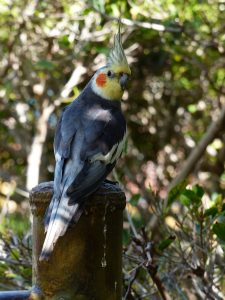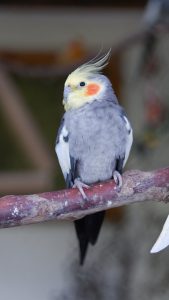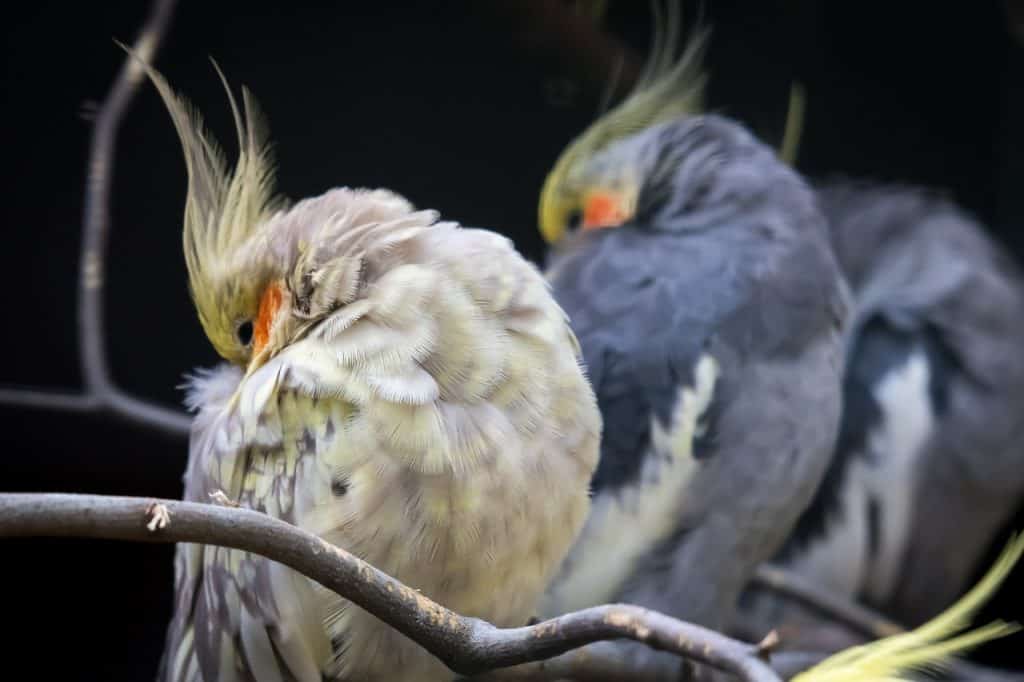Cockatiels are one of the most beloved pet birds in the world, known for their playful personalities and beautiful plumage. However, there is one aspect of owning a cockatiel that many pet owners find less than charming: the dust. Why are cockatiels so dusty?
Cockatiels are notorious for being particularly dusty birds, and their fine powdery feathers can create a mess in even the tidiest of homes. In this blog post, we’ll explore the reasons why cockatiels are so dusty and what you can do to minimize the mess. Whether you’re a seasoned cockatiel owner or are considering adding one to your family, you won’t want to miss this informative guide.
Why are cockatiels so dusty?

As with all birds, cockatiels produce a lot of white powder down feathers that can be very difficult to stop from spreading around your home. Parrots including cockatoos, cockatiels, and African greys possess matte and soft powder-based feathers which require frequent preening to maintain their feather health. This is why they are associated with dustiness—simply put, cockatiels are the most dusted birds out of all the parrots!
Let’s get down to the root cause of why cockatiels are so dusty.
Natural Causes of Dustiness in Cockatiels
Physical characteristics of cockatiel feathers: Cockatiels have a unique feather structure that includes small barbs, which can easily release tiny particles of dust. This is especially true when the feathers are in need of preening or molting.
Cockatiel grooming habits: Cockatiels naturally spend a lot of time preening their feathers, which serves to clean and oil them. While preening is essential for healthy feathers, it can also release particles of dust into the air.
Environmental Causes of Dustiness in Cockatiels
- Exposure to outdoor dust: Even if your cockatiel lives indoors, it may be exposed to dust from the outdoors. Opening windows or doors can allow dust particles to come into your home, which may be inhaled by your bird.
- Lack of humidity: Low humidity levels in the air can contribute to dry skin and feathers, leading to an increase in dustiness. This is even more likely if you live in a dry, hot climate.
- Lack of bathing opportunities: While cockatiels don’t need to bathe as often as some other pet birds, they do benefit from regular bathing opportunities. This helps to keep their feathers clean and reduces the amount of dust in your home.
- Inadequate diet: A healthy diet is essential for overall health in cockatiels, including feather health. A lack of essential vitamins and minerals can lead to dry, brittle feathers, which are more likely to produce dust particles.
Now that you know why cockatiels are so dusty, let’s look at some practical tips for minimizing the mess in your home.
Role of dust in maintaining feather health
A certain amount of dust is actually beneficial for cockatiels. Dust helps to absorb oils from the skin and feathers, which can improve feather health and reduce the risk of bacteria and parasites.
Tips for Reducing Dustiness in Cockatiels
Provide regular bathing opportunities: As we mentioned earlier, bathing is essential for maintaining feather health and reducing the amount of dust in your home. Offer your cockatiel regular baths using a bird-safe bath spray or mist.

- Increase humidity levels: Dry air can lead to dry feathers, which may release more particles of dust. You can use a humidifier to increase the humidity in your home, or place a shallow bowl of water near your cockatiel’s cage. In the same room, another way is to mist your cockatiel’s feathers twice a day.
- Keep windows and doors closed: To reduce dust coming from the outdoors, keep your windows and doors closed when possible. Also make sure to clean regularly using a vacuum cleaner that has a HEPA filter.
- Feed a healthy diet: A nutritious diet is essential for maintaining feather health in cockatiels. Make sure to provide a balanced diet that includes fresh fruits and vegetables, as well as a seed mix specifically designed for cockatiels.
- Bathing tips: To help keep your cockatiel’s feathers clean, use a spray bottle to mist their wings and body during the bathing routine. In bird’s cage, you can also offer your pet a shallow dish of warm water for them to bathe in.
Potential health implications for both you and your bird if there is too much dust in its environment
Is cockatiel dust harmful? Inhaling too much dust can be harmful to both you and your bird. For humans, too much dust can trigger allergic reactions or worsen existing conditions such as asthma. Meanwhile, birds are especially sensitive to dust particles and inhaling too much can cause respiratory issues. Additionally, the buildup of dust on feathers may interfere with their ability to properly regulate body temperature. Long-term exposure to dust can even lead to serious health problems such as infections or obesity.
Therefore, cockatiel owners should be proactive in minimizing the amount of dust in their pet’s environment. It’s important to take steps to reduce the amount of dust in your home if you have a cockatiel. Regular cleaning and increasing humidity can help keep your bird healthy and minimize the impact of dust on its health.
Are wild cockatiels dusty?
Wild cockatiels, like their pet counterparts, can be affected by dust. However, in the wild they have more opportunities to bathe and keep their feathers clean than caged birds do. Additionally, wild cockatiels are exposed to fewer pollutants and irritants than those living in captivity. Therefore, it is likely that wild cockatiels experience less dustiness than pet cockatiels.
Final thoughts: Why are Cockatiels So Dusty?
Bird dust is a common problem for bird owners, and cockatiels are no exception. Cockatiel dust is caused by a variety of factors, including exposure to outdoor dust, low humidity levels in the air, lack of bathing opportunities, and inadequate diet. Too much dust can be harmful to both humans and birds, so it’s important to take steps to reduce the amount of dust in your home if you have a cockatiel. Regular cleaning, increasing humidity, providing bathing opportunities, and feeding a nutritious diet can all help reduce the amount of dust released by your bird. With some simple steps, you can enjoy a cleaner home while keeping your pet bird happy and healthy.
Cockatiels are fun and entertaining pets, but their dustiness can be a hassle. With the right steps, however, you can easily keep the dust levels in your home to a minimum and ensure that both you and your bird remain healthy. Take these tips into action today to reduce cockatiel dust in your home!
- Why Is My Cockatiels Poop Watery
- Why Is My Cockatiel Vomiting
- Why Is My Cockatiel So Quiet
- Why Is My Cockatiel Shaking
- Why Is My Cockatiel Losing Feathers
- Why Is My Cockatiel Laying Eggs On Bottom Of Cage
- Why Is My Cockatiel Eating So Much
- Why Is My Cockatiel Chirping So Much
- Why Does My Cockatiel Scream When I Leave The Room
- Why Does My Cockatiel Nibble Me
- Why Does My Cockatiel Keep Yawning
- Why Does My Cockatiel Hang Upside Down
- Why Does My Cockatiel Fly On My Head
- Why Does My Cockatiel Face The Wall 6 Reasons
- Why Does My Cockatiel Bob His Head
- Why Does A Cockatiel Stand On One Leg
- Why Do Cockatiels Sing
- Why Do Cockatiels Hiss
- Why Do Cockatiels Have Crests
- Why Do Cockatiels Eat Their Poop
- Why Do Birds Rub Their Beaks
- Why Do Birds Poop In Their Water
- Why Cockatiels Like Head Scratches
- Why Cockatiels Grind Their Beaks
- Why Choose A Cockatiel Bird As A Pet
- Why Are My Cockatiels Tail Feathers Falling Out
- Why Are My Cockatiels Fighting
- Why Are My Cockatiels Feet Warm
- Why Are Cockatiels So Dusty



